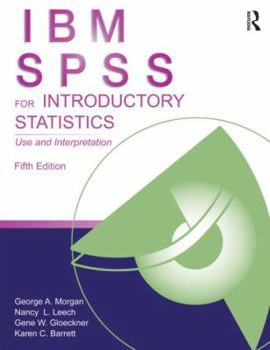IBM SPSS for Introductory Statistics: Use and Interpretation, Fifth Edition
Select Format
Select Condition 
Book Overview
Designed to help students analyze and interpret research data using IBM SPSS, this user-friendly book, written in easy-to-understand language, shows readers how to choose the appropriate statistic based on the design, and to interpret outputs appropriately. The authors prepare readers for all of the steps in the research process: design, entering and checking data, testing assumptions, assessing reliability and validity, computing descriptive and inferential parametric and nonparametric statistics, and writing about outputs. Dialog windows and SPSS syntax, along with the output, are provided. Three realistic data sets, available on the Internet, are used to solve the chapter problems.
The new edition features:
Updated to IBM SPSS version 20 but the book can also be used with older and newer versions of SPSS. A new chapter (7) including an introduction to Cronbach's alpha and factor analysis. Updated Web Resources with PowerPoint slides, additional activities/suggestions, and the answers to even-numbered interpretation questions for the instructors, and chapter study guides and outlines and extra SPSS problems for the students. The web resource is located www.routledge.com/9781848729827 . Students, instructors, and individual purchasers can access the data files to accompany the book at www.routledge.com/9781848729827 .
IBM SPSS for Introductory Statistics, Fifth Edition
provides helpful teaching tools:All of the key IBM SPSS windows needed to perform the analyses. Complete outputs with call-out boxes to highlight key points. Flowcharts and tables to help select appropriate statistics and interpret effect sizes. Interpretation sections and questions help students better understand and interpret the output. Assignments organized the way students proceed when they conduct a research project. Examples of how to write about outputs and make tables in APA format. Helpful appendices on how to get started with SPSS and write research questions.
An ideal supplement for courses in either statistics, research methods, or any course in which SPSS is used, such as in departments of psychology, education, and other social and health sciences. This book is also appreciated by researchers interested in using SPSS for their data analysis.





